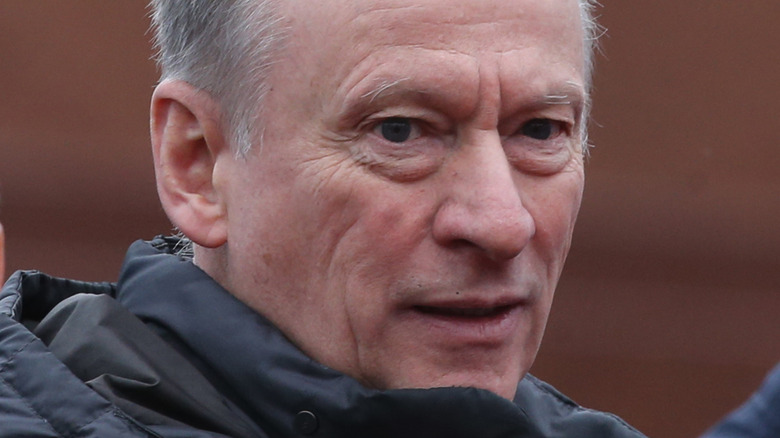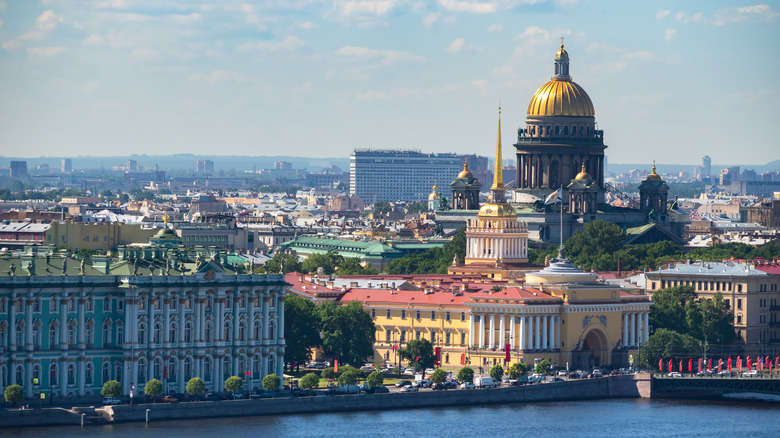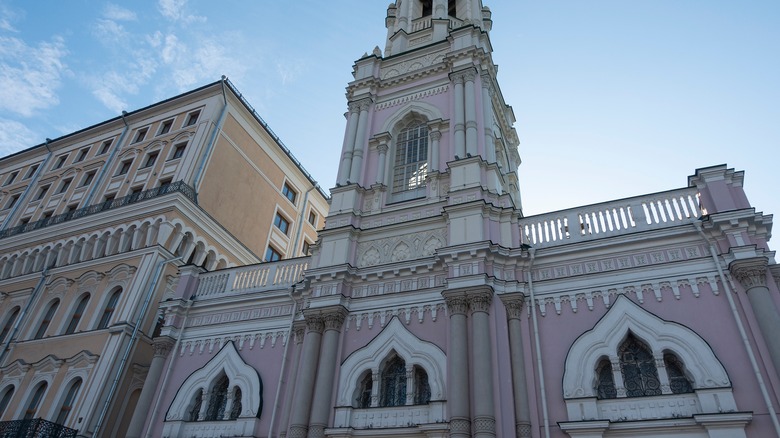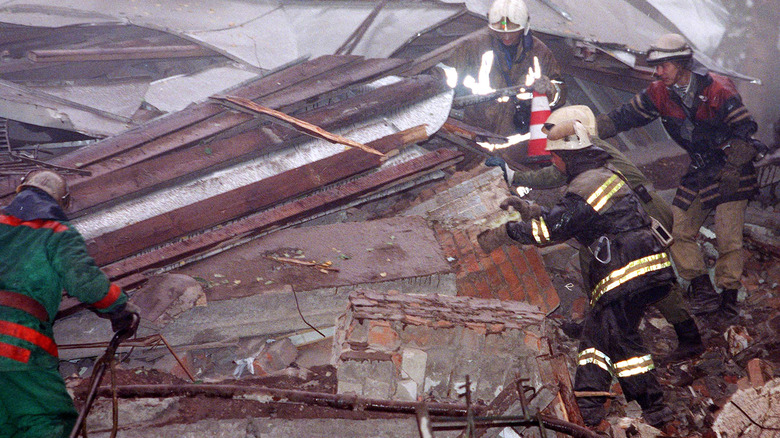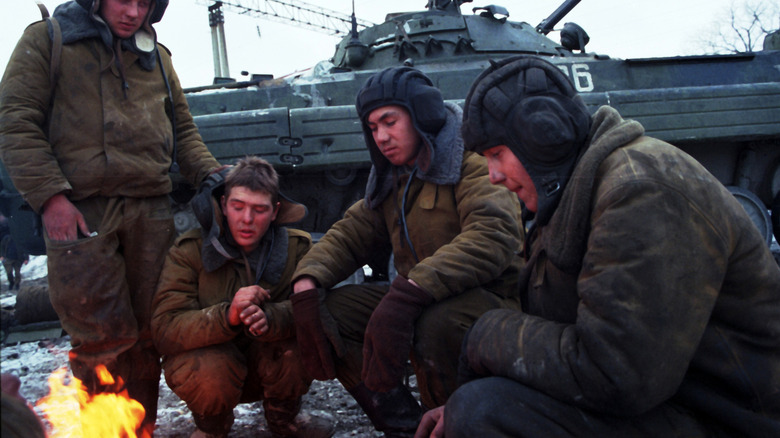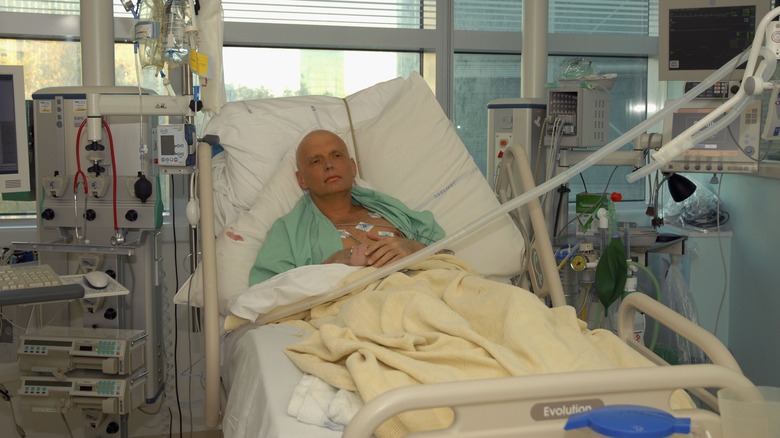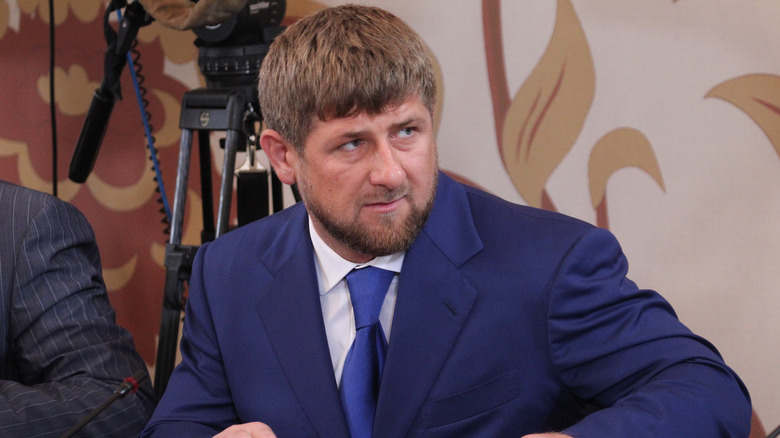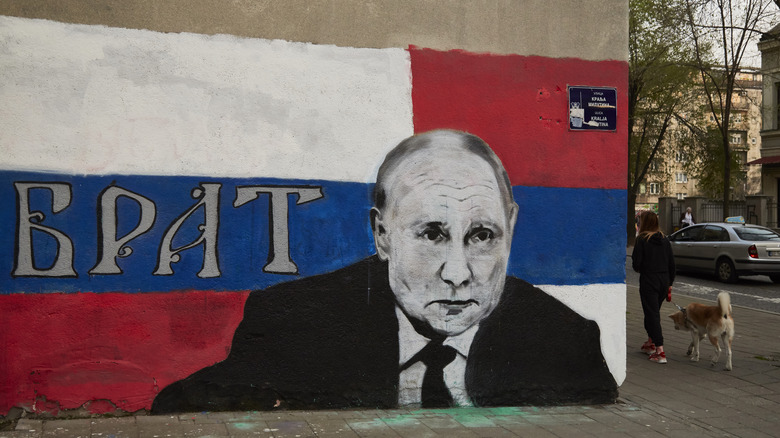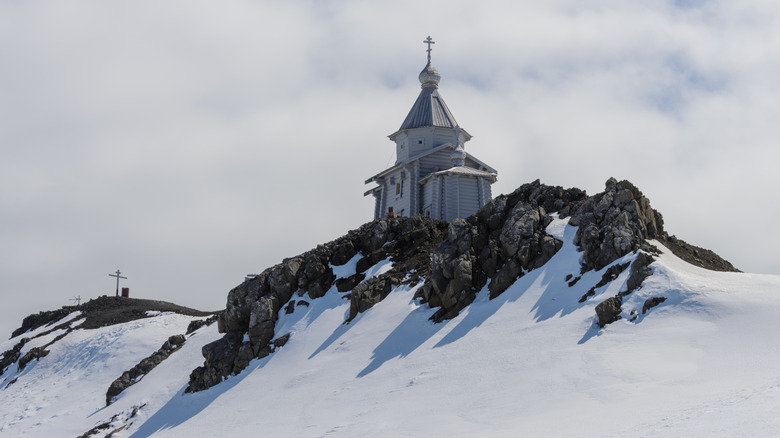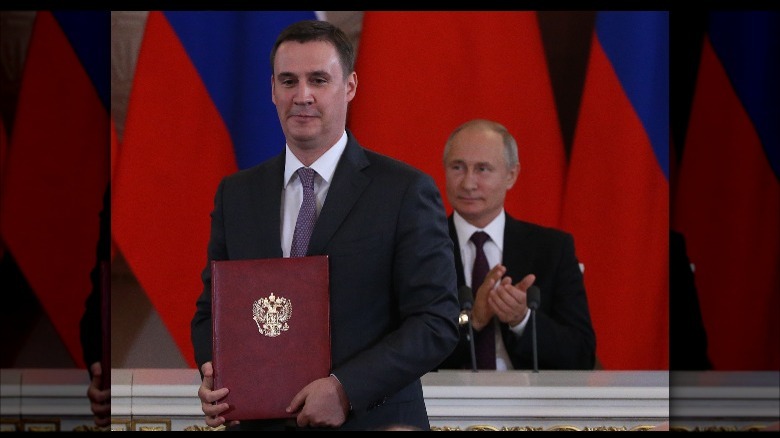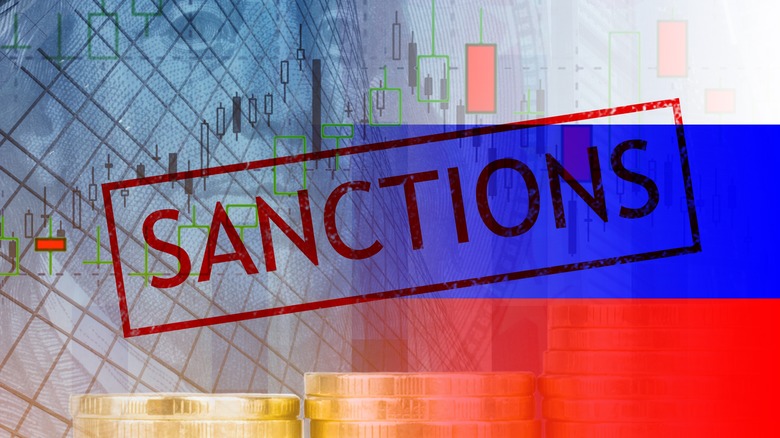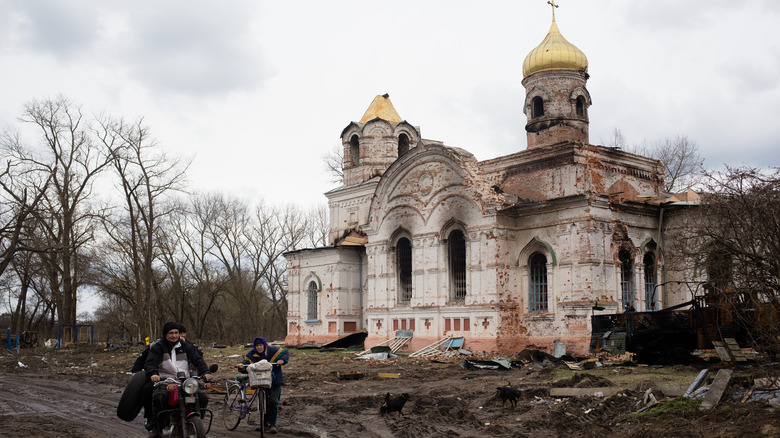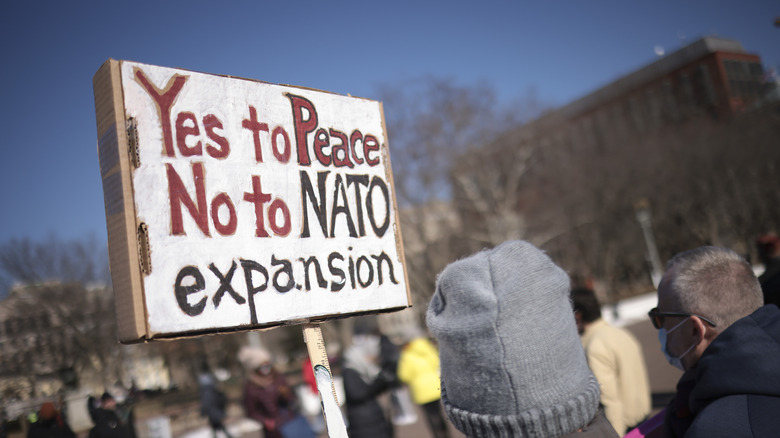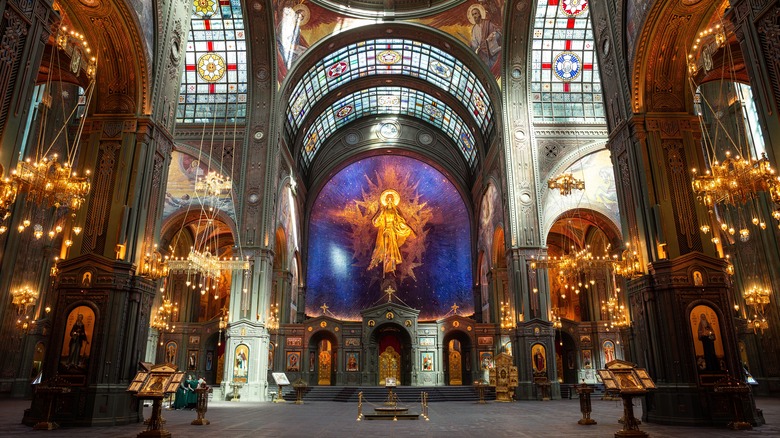Who Is Nikolai Patrushev, Head Of The Russian Federal Police?
Russian Federal Security head Nikolai Patrushev — who in 2022 was in line to govern Russia pro tempore while President Vladimir Putin underwent surgery for thyroid cancer — is virtually unknown in the West. According to the Spisok Putina project, he was born in St. Petersburg (then Leningrad) in 1951 to a military family of communists. After high school, he went to the KGB's training schools and ascended the ranks of the Soviet security apparatus. He met fellow KGB operative Vladimir Putin during this time. After the USSR's collapse, he served the Republic of Karelia in anti-corruption and anti-smuggling capacities, reaching the rank of security commissioner.
Patrushev's rise accelerated once the KGB became the FSB following the fall of the USSR. Throughout his career, Patrushev has espoused Russian nationalism, with Politico calling him a "Kremlin hawk." But this one-sided view is dangerous. Still, the publication notes that Patrushev has capably served the Russian "adhocracy" in numerous capacities outside his expertise, and he has a thorough understanding of Russia's historical role in Europe.
The not-so-good communist
According to New Lines Magazine, the second-most powerful man in Russia was born in St. Petersburg to a family that survived the German invasion. His father was a naval officer and a member of the Communist Party (per Asianet News). But rumor has it that the family was not particularly dedicated to communism. Nikolai Patrushev grew up in the old Russian capital right next to a number of imperial Russian landmarks that influenced his outlook on Imperial Russian history and communism, which made him a maverick of sorts at the KGB.
Soviet defector and fellow operative Oleg Kalugin claimed that Patrushev was not one to rigidly enforce the Soviet party line on dissidents. Per New Lines Magazine, when those accused of "anti-Soviet agitation" were brought in for interrogation, Kalugin recommended that Patrushev talk to them and convince them why they were wrong — if anything, just to avoid arresting them. Obviously, this is not a testament to Patrushev's open-mindedness but his willingness to bend KGB rules to spare dissidents potentially fatal consequences.
Patrushev became the FSB head when his old friend Vladimir Putin became president in 2000. Since becoming FSB director, there is the question of how Patrushev — despite serving for the communist KGB — could have skirted around KGB regulations that allowed dissidents to go free. It suggests that Patrushev had anti-Soviet sympathies himself. But while his religious beliefs might have influenced his complicated relationship with communism, they have made him at home in the Putin Kremlin.
His religious views
Nikolai Patrushev's wishy-washy relationship with communism and his KGB duties suggest that his political ideology lies elsewhere. As New Lines Magazine notes, Patrushev, unlike many Soviet government employees, was not an atheist. Instead, he had a strong religious commitment to the Russian Orthodox Church (ROC).
Patrushev's religion has rarely, if ever, appeared in Western media, but his actions speak louder than words. Upon becoming FSB director, Patrushev supported and in part funded the renovation and reconsecration of the Sophia Wisdom of God Orthodox Church (above), located near FSB headquarters. The church's reconsecration suggests that the Soviets had originally shut it down or repurposed it, as they tended to do (via Russia Beyond)
So how does Patrushev's faith figure into his politics? His role in reconsecrating an old church and his childhood surrounded by Imperial Russia's glory suggests that he identifies strongly with Russia's czarist history. Furthermore, as scholar Anastasia Mitrofanova notes in "The New Russian Nationalism," the ROC is a strong supporter of Russian nationalism. So a dedication to Russian history and religion has unsurprisingly produced a politician who sees himself as a servant of the nation — a sentiment that he made abundantly clear as newly-minted FSB director in 2000 when the Second Chechen War broke out.
The Ryazan Incident
Nikolai Patrushev's public pronouncements of Russian nationalism came in the context of the Second Chechen War. He was first, however, embroiled in a major controversy over the war's start. According to a 1999 CNN story, Russia faced a wave of apartment bombings that were blamed on Chechen separatists and became one casus belli for the war. The same year, the Los Angeles Times reported that civilian Alexei Kartofelnikov had reported suspicious men carrying sacks in his building. Believing it was another bomb, he called the police. However, Patrushev, following an investigation, claimed that the incident was an anti-terrorism drill. The white powder, he claimed, was just sugar. However, the Russian interior minister claimed that a bombing had been prevented. So either he got it wrong, or Patrushev covered up a false flag.
The truth is unknown, but the incident can either cast Patrushev in a good light (assuming that it really was a security drill) or serve as a damning indictment of the FSB director if it was a false flag. Was Patrushev a Russian nationalist dedicated to stopping bombings, or a Russian chauvinist intent on helping his boss create the pretext for a full-scale invasion of Chechnya?
The Chechen War
Nikolai Patrushev's nationalistic sentiments have often been seen as an us-versus-them mentality. This type of thinking appeared in a Komsomolskaya Pravda interview about the Chechen crisis. Patrushev argued that Russia had the responsibility to stop international Islamic terrorists in its own lands or risk collapse. Foreign Islamic fighters — not the Chechen people — were fomenting strife, something Russia could not tolerate. The internal collapse of the Chechen Republic of Ichkeria had allowed international terrorist groups — particularly those embracing the purist Saudi Wahhabi strain of Islam — to operate with impunity and commit crimes against Russia.
In addition to Islamic fighters, Patrushev accused foreign NGOs and intelligence services — specifically the Halo Trust — of arming Chechen Islamic extremists under the guise of humanitarian work. The stress on the role of Anglo-American organizations in fomenting unrest was an early indicator of Patrushev's anti-NATO sentiments and foreshadowed his statements claiming that the West wanted to destroy Russia (via Fox News). So in this regard, Patrushev's sentiments can seem dualistic in light of such accusations. But as shall be seen, Patrushev has been perfectly capable of compromising with his opponents when expediency has demanded it.
The Litvinenko Affair
Although Nikolai Patrushev has been willing to compromise in other cases, this sentiment was not extended to former Russian operative Aleksandr Litvinenko. Here, his anti-NATO sentiments — particularly against the U.K. and the United States — likely influenced his views and involvement in the case. According to the official U.K. report, Litvinenko was poisoned in London after ingesting polonium. The report concluded that FSB agents were responsible.
So how likely is this? Russia specialists noted in the report that the price of failure in the Russian intelligence community and the Soviet apparatus before that was high. Thus, in order to cover the backs of the upper echelons of the service and field operatives, most operations were approved by the highest levels of the Soviet government to ensure that blame did not fall further down. So assuming FSB involvement, Patrushev would have had to know of the plan and approve the killing before passing the operation on to his boss, Vladimir Putin.
Patrushev's guilt would cast him in a more ruthless light with two possible motivations. As New Lines Magazine notes, Litvinenko blamed the FSB — and therefore Patrushev — for the 1999-2000 bombings. As the BBC noted, Litvinenko had also worked with British intelligence, whom Patrushev implied were aiding Chechen extremists. If Litvinenko was truthful, Patrushev cynically approved Litvinenko's killing to protect himself. Otherwise, he probably viewed Litvinenko — one of Patrushev's fellow FSB employees — as a traitor and collaborator with the anti-Russian U.K. Regardless, it does show that one way or another, the president pro tempore is not one to be trifled with.
The conflict with Kadyrov
While the Litvinenko incident depicted an uncompromising Nikolai Patrushev, the FSB's clash with Chechen President Ramzan Kadyrov depicted him as more amenable to negotiation as Vladimir Putin's fixer. According to Radio Free Europe, Putin appointed Kadyrov in 2007. But Kadyrov wanted control of all armed forces in Chechnya — including those under Russian federal control — and the FSB stood in his way. According to a Chechen FSB operative interviewed in Kommersant, when Kadyrovtried to take control of the Chechen FSB's headquarters, they refused him access. So the Kadyrovci — as Kadyrov's militias are called — welded the doors of the complex shut.
Patrushev — as FSB head — was dispatched to resolve this delicate situation with Kadyrov. The Chechen president offered stability in the Caucasus, and Russia did not want to jeopardize that. The exact settlement is unknown, but a 2015 repeat of the FSB-Kadyrov conflict suggests that Putin and Patrushev threw their old FSB comrades under the bus in Kadyrov's favor. According to Radio Free Europe, when dissident Boris Nemtsov was killed, Kadyrov's men were widely believed to be the killers. The FSB tried to blackmail Kadyrov, but Putin — and presumably Patrushev — decided to back Kadyrov and dismiss the Nemtsov killing as an isolated incident rather than a contract hit. The 2007 welding incident was likely a precedent for dealing with Kadyrov. Thus, Putin and Patrushev sacrificed some support from their biggest allies in the security services to maintain an uneasy peace in the Caucasus. Indeed, Patrushev appears a calculating politician that puts Russia first — even if it means compromising his ideals.
Putin's man in the Balkans
Nikolai Patrushev's background is in espionage, not diplomacy, so he seemed like a strange choice to serve as Vladimir Putin's diplomatic fixer in the Balkans. But as Politico notes, the Russian government has increasingly become an "adhocracy," in which Putin's most trusted lieutenants fulfill a variety of roles based on experience rather than credentials. In Patrushev's case, his understanding of Russia's history of Balkan involvement landed him the appointment.
Patrushev's Balkan appointment is best understood through his appointee Leonid Reshtnikov and their understanding of Russian history. The Russian Balkan expert claimed that it was "time for Russia to return to the Balkans," probably in reference to Russian involvement in the 19th-century Balkan wars of national liberation on behalf of states such as Romania, Bulgaria, and Serbia against the Ottoman Empire (via "Humanitarian Intervention in the Long Nineteenth Century"). With this appointment, Patrushev demonstrates an understanding of history that may help Russia expand its Balkan influence at NATO's expense.
In concert with Putin ally Konstantin Malofeev, Patrushev has courted Russia's old ally Serbia with pan-Slavic and Pan-Orthodox overtures (via ECFR) and was implicated in a coup against the pro-NATO government of Montenegro. Recently, this view has hardened thanks to Turkish "Neo-Ottomanism" that has tried to draw the Balkans back into Turkish orbit. This attitude explains Russia's blessing to the Orthodox Republika Srpska, which exists as an autonomous region within Muslim-Catholic Bosnia. Altogether, Patrushev's vision sees Russia reprise its role as a protector of Orthodox Slavic faithful in the Balkans — all while forming a barrier to NATO expansion.
Visiting the South Pole
While Nikolai Patrushev's historical knowledge has lent well to politicking, he is a man of many faces who has advanced Russia's image abroad through promotion of Russian scientific research and exploration. According to Radio Free Europe, Patrushev made an official FSB visit to the South Pole on Russian Christmas Day on January 7, 2007. This begs the question: Why would an FSB bureaucrat visit Antarctica, of all places?
The visit seemed to be all about public relations. Radio Free Europe argued that Patrushev's visit accomplished several objectives. First, it showed the FSB director's curious side, visiting and admiring Russian scientific exploration and inquiry firsthand. Second, it drew attention to Russian claims on Antarctic territory for the purpose of undermining American claims to the continent. The symbolism of raising the Russian flag over the South Pole was surely not lost on international observers.
It was not the first time Patrushev had participated in such endeavors. He joined an FSB expedition that planted the Russian flag at the North Pole in 2003 and another one to plant the Russian flag on Mt. Elbrus — Europe's highest mountain. So Russia's image really seems to matter to Patrushev. These various initiatives are all meant to underscore that Russia has reclaimed its status as a global power — thanks in no small part to his own efforts.
The family business
Nikolai Patrushev's family life is closely intertwined with the Russian state. He is married to Elena Patrusheva and has two children named Alexei and Dmitri. His sons are closely involved in politics and business tied to the Kremlin. According to Reuters, Dmitri is the head of the Russian Agricultural Bank. His critics (via Spisok Putina) have accused him of nepotism, corruption, and academic plagiarism while earning his doctorate. In his management of the bank, critics have accused him of running it into the ground with multi-million ruble losses over two years. According to OCCRP (a transparency project on the Panama Papers), his other son Alexei offshored money in Caribbean tax havens to avoid paying taxes over timber-harvesting operations in Karelia. The Russian tax authorities fined his company for tax evasion.
The Moscow Times accused all of the Russians named in the Panama Papers — including the Patrushev children — of hypocrisy. Although offshoring money was not in itself illegal, it conflicted with the oligarchs' anti-western statements. It seemed hypocritical that men who had railed against the U.S., the U.K., and NATO should be hiding or investing their money in those very same countries. Some even had mansions there. According to VOA News, the Kremlin claimed that the accusations were an attempt to undermine the Russian government. But as The Moscow Times argued, pointing out hypocrisy by Russia's ruling elite is not "Putinophobia."
Getting sanctioned
Nikolai Patrushev's nationalism has unsurprisingly landed him into trouble with the United States and the European Union over the Russian annexation of Crimea. As the Wilson Center notes, Crimea was part of Russia until 1954, when despite its Russian supermajority, it was transferred to the Ukrainian SSR. So when Russia annexed Crimea in 2014 following a controversial referendum, nationalists such as Patrushev no doubt supported the move.
In response to the Crimea annexation, the United States and Europe issued sanctions for a "range of malign activity around the globe, including continuing to occupy Crimea," per the Treasury Department. The department announced sanctions to freeze assets and forbid Americans and American corporations from doing business with sanctioned individuals. Patrushev is on that list as director of the Security Council of the Russian Federation. The EU also issued its own sanctions, accusing Patrushev of coordinating and shaping Russian policy to encroach on Ukraine's territorial sovereignty. So how do these accusations line up with Patrushev's opinions on Ukraine? As a Russian nationalist, he should be all-in on the conflict. But interestingly, he has been more measured, possibly because the conflict might result in severe consequences for Russia's stability.
Patrushev and Ukraine
According to Russian outlet Sobesednik, Nikolai Patrushev clearly stated that "we [Russia] do not want war." War was not necessary, Ukraine did not believe there was a threat, so NATO should stop stoking the tensions. But in the end, Russia did enter Ukraine. So how can Patrushev's mixed messaging be explained?
The Times suggests that Patrushev sought to create a rift between the Ukrainian government and NATO. Ukrainian President Volodymyr Zelensky downplayed fears of a Russian invasion while Washington stressed them. But this view fails to consider Patrushev's other statements. Now, the Russian minister likely supports greater Russian influence in Ukraine at a minimum. As the New York Post notes, he subscribes to the idea that Russians and Ukrainians are one people — a narrative that holds some truth but ignores historical divergences over the past millennium. However, his latest statements suggest that his opposition is sincere and lies in preventing the creation of a European Afghanistan on Russia's doorstep.
According to Russian outlet Izvestia (via TASS), Patrushev voiced concerns that NATO was flooding Ukraine with weapons. Per CNN, the U.S. government "doesn't really know" where the weapons are ending up. This — alongside the volatile mix of foreign fighters, political extremists, and Ukraine's fractured socio-political landscape — creates a scenario for drug and human trafficking, political and ethnoreligious violence, and massive refugee flows to thrive. Patrushev argues that such a situation would undoubtedly be terrible for Russia's stability should the United States and NATO repeat the disastrous American exit from Afghanistan in Ukraine and leave the country to fend for itself.
Patrushev the anti-liberal
More recently, Nikolai Patrushev has inserted himself into the culture wars that have pitted Western liberalism against more authoritarian societies that find their roots in traditional values and religion. According to an interview with Rossiyskaya Gazeta (translation via Army University Press), Patrushev made his distaste for liberalism clear. Western democratic systems often leave a trail of destruction after forcibly introducing liberal democracy into societies with completely different worldviews. In Russia, this came in the form of communism, while in the Middle East, it came in the form of American occupation and subsequent insurgencies.
In the interview, Patrushev argues that the destruction results from the need of liberalism to replace all previous values and structures (particularly religion) to create an atmosphere of "individualism, egoism, the cult of pleasure, unrestrained consumption, and ... the freedom of any self-expression." He focuses primarily on American intervention in the conservative Islamic societies of the Middle East but also notes that in Russia, liberalism came in part in the form of the Bolshevik Revolution.
Noting the chaos ensuing from American intervention in the Middle East, Patrushev has argued all Russians — including non-ethnic Russians and non-Orthodox — must be insulated from liberalism if the country is to stay together. Thus, he argues that any future international order must respect national sovereignty first and foremost and reject interventionism. If states are allowed to manage their own affairs without interference from other powers, he believes the world will be better off.
Patrushev immortalized?
Nikolai Patrushev, as part of Vladimir Putin's inner circle, nearly became immortalized in the Armed Forces Cathedral, a church dedicated to Russia's armed forces inaugurated in 2020. According to France 24, the Russian Orthodox Church and the architects of the cathedral planned two controversial mosaics. One read "Crimea is ours," while the other depicted Soviet dictator Joseph Stalin, Vladimir Putin, Patrushev, and various other leaders of Russia and the USSR.
The mosaics were controversial. Critics noted that memorializing anti-Christian dictator Stalin in a church made no sense, while historians questioned the wisdom of immortalizing the handful of Russian government officials too. The Russian Orthodox Church rejected the criticism claiming that Russia and the church's history could not simply be overlooked. In the end, however, the church reversed itself, claiming that Putin himself had urged them to drop the matter as it was too early to celebrate his achievements and those of his inner circle (via Reuters). Patrushev does not seem to have commented.
